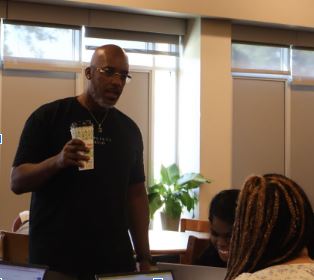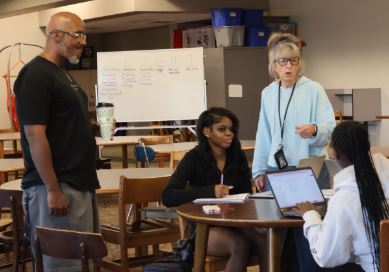
Mya Sanchez
Che Whitner talking to students in the 'School Within a School' at MCHS.
Che Whitner is a sturdy wall at Mason City High School, keeping students who need a role model on a steady pathway. Originally from the urban area of Southside Minneapolis, he’s been a Behavior Interventionist and boys’ basketball coach since 2019.
Every day, Che (he prefers students call him by his first name over Mr. Whitner) talks a student down from a breakdown and makes sure they’re okay. Every hero saves a life, but not every hero wears a cape.
[The following interview has been edited and condensed.]
Did you have any unreasonable fears as a kid?
That depends on what’s unreasonable. The typical snakes, spiders, death, etc. I lived a block away from the neighborhood gymnasium, so I’d cut through the alley. [One night] my friend was fatally shot in that same alley, and I always feared that I’d get shot too, especially coming home from the gym at night.
What was life like growing up?
[I had] two atmospheres. Family life [was] very close, tight-knit, and loving. My mother was very nurturing– a single mother taking care of five kids. Best mom that I could’ve ever asked for. I’m the youngest of five children. Three of my siblings live on their own. The family atmosphere was probably the best memories of my childhood.
Then there was my environment which was poverty-stricken with gang activity. The positive thing was it made me want to be a better person. I began coaching sports and eventually became the director of FLYS [Francis Lauer Youth Services in Mason City]. This is what put me on the path of working at schools and the community.

How do you respond to emotional situations?
I remain calm and allow myself the time to control my breathing. I’m a firm believer in taking time out for yourself to collect your thoughts and utilize coping skills when needed.
How do you cope with stress?
The days can be long, but not stressful. There’s so much more that we can do besides getting stressed out about things that we have no control over. It’s also very important to know your limitations. When I feel like it’s time for me to tag someone else in,
I do that before losing my composure. I use the teachings of Aggression Replacement Training (ART) and practice what I preach: taking deep breaths and positive self-talk.
What led you to choose this job?
Being a former program director [for FLYS] made me want to work with students outside of the system. Our program received a lot of students that were on probation, which meant they had to complete the probationary period in order to deter the possibility of getting sent to a group home. Working here, I’m able to reach them before they’re placed on probation. Through peer mediation and social-emotional skill building, I’m able to work to help build successful young men and women in our community.
What are your future plans for this career?
Each year I try to one-up myself. What I would like to do is teach our upperclass students to teach the underclass students and keep that rolling for years. I would also like to coach basketball at the collegiate level, so coaching high school and circuit-level AAU basketball helps.
Do you feel a connection to your students?
Absolutely. Connections are imperative in my line of work. [My students] need to know that I’m a trustworthy adult that will help them through challenging situations. It’s hard to teach a student if you don’t have a relationship with them, if they think you don’t have respect for them, or have their best interest at heart.